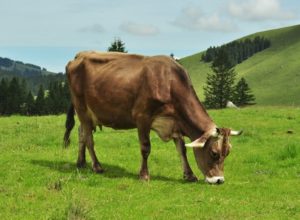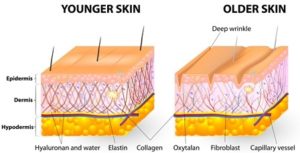Bovine Hide Collagen Peptides are collagen peptides extracted from cow skin.
Contents
Uses
- The protein in cow skin, known as collagen/gelatin is extracted for use in the pharmaceutical, food and cosmetics industries.
Benefits
- Bovine collagen is also known as bovine cartilage or beef collagen. Gelatin is a form of hydrolyzed beef collagen, which means it’s essentially a part of broken-down collagen. Where does bovine collagen come from? It’s a naturally occurring protein found in the cartilage, bones and hides of cows. This type of collagen is very similar to what we have in our bodies and provides a healthy dose of types I and III collagen.
- Type I collagen and type III collagen are the major components of skin, hair, nails, muscles, tendons, ligaments, bones, gums, teeth, eyes and blood vessels. Together, types I and III collagen make up more than 90 percent of the collagen in our bodies.
- Bovine collagen is rich in the amino acid glycine, which is necessary for building healthy DNA and RNA strands. These are the essential genetic building blocks for properly functioning body cells. Glycine is also one of the three amino acids that form creatine. Creatine is known to support, promote healthy muscle growth and aid in energy production during workouts.
- Last but not least, bovine collagen also provides the amino acid proline. Proline plays a critical role in the body’s ability to produce its own collagen.
- Hydrolyzed beef collagen was produced as a food supplement after scientists learned to break the long chain triple helix protein into shorter pieces and then separate the three helices from each other. The resulting short individual peptides make up hydrolyzed collagen.So in essence bovine hide collagen peptide:
- Treats Osteoarthritis
- Improves Gut Health
- Builds Muscle and Repairs Tissue
- Promotes Deeper Sleep
- Improves Skin Quality
- Works as a Topical Treatment
Cautions
- Hydrolyzed bovine collagen is widely used in nutrition supplements. The FDA considers it as generally recognized as safe. It’s also a widely accepted and considered a safe food additive in many countries. (12)
- Bovine cartilage is considered safe when taken in proper amounts by mouth or applied to the skin. Generally, it does not tend to cause any significant side effects. Minor side effects, however, can include digestive upset or rash. If you have a reaction to topical application of collagen, discontinue use.
- When it comes to bovine collagen, some people are concerned about mad cow disease, which is a rare illness you can get from eating infected beef. Mad cow disease does not appear to be transmitted through cartilage products like collagen supplements, but it’s probably a good idea to stay away from animal products from countries where mad cow disease has been found.
- If you’re pregnant or breast-feeding, collagen supplements are not recommended.
Interactions
- Hydrolyzed collagen has not been found to have any significant drug or food interactions, but talk to your doctor before taking collagen if you currently take any other medications.
Other names
Bovine cartilage, Beef cartilage
References
Source: FunkeKoleosho, http://funke-koleosho.blogspot.bg/2015/12/cow-skin-pomo-to-eat-or-not-to-eat.html
DrAxe, https://draxe.com/bovine-collagen/
Image source: https://www.linkedin.com/pulse/rhinoplasty-nose-job-jmj-cosmetic-surgery-clinic



Hello….l’m a vegetarian. Should l consume collagen peptides made wirh bovine hide?
Does the bovine collagen peptides help with high cholesterol?